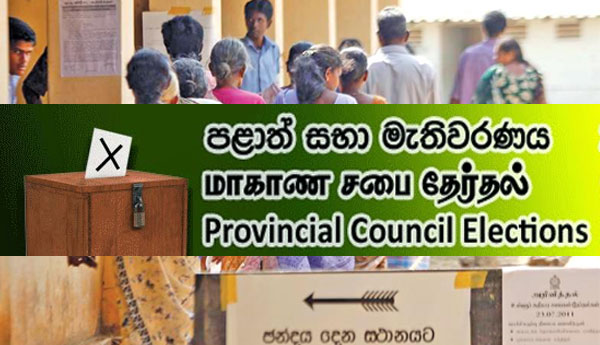Sri Lanka’s long delayed provincial council elections will not be held until a suitable election system has been decided on, a cabinet spokesman said on Tuesday (19) despite persistent Indian pressure to have the polls by the end of the year.
The provincial council system was introduced through the controversial 1987 Indo-Lanka accord aiming to devolve power to the provinces as a remedy for issues faced by ethnic minority Tamils in the islan’ds North and East. The accord was signed amid a civil war raging in the north and east and amid vehement opposition from the majority Sinhalese.
However, successive governments hesitated to fully implement the 13th amendment to Sri Lanka’s constitution which sought to incorporate the Indo-Lanka accord and the provincial council setup. Governments have repeatedly rejected full implementation by not devolving land and police powers to each province.
The tenure of each nine provincial councils in the island elapsed between 2015-2017 as the previous government proposed a new electoral system to hold the next elections to the provincial polls in 2017. However, the bill was not enacted by the parliament as there was no consensus on delimitation.
If Sri Lanka has to hold provincial polls, it has to pass an amendment with a simple majority to go back to the old system or with a two-third majority to go for a mixed system, legal and political analysts say.
“The amendment to the provincial council act submitted by the last government is a controversial one. We need to rectify that,” Cabinet Co-Spokesman and Media Minister Dullas Alahapperuma told the weekly cabinet news briefing.
“We cannot exactly say when the elections will be held. It will be held after the election system is changed.”
Last week, Foreign Minister G L Peiris said the provincial polls will likely be held before March 2022 but it will not be due to pressure from India or any other foreign government.
Alahapperuma further said Sri Lanka has four different election systems for presidential, parliamentary, provincial, and local government polls.
The presidential election considers the whole country as one constituency, a system similar to what is seen in most democracies.
“But parliamentary elections are fully based on a representative system. A local government election amendment changed the system to 50 percent representative system and 50 percent electorate system,” Alahapperuma said.
“The provincial council election is going to be based on a 60 percent electoral system and 40 percent representative system. This system is a joke to the entire world.”
Alahapperuma said Sri Lanka needs to move on from the current practise of having a different election system for every election.
“The president is of the view that electoral reform must take place while preserving the good characteristics of the representative system,” he said.
“When [Sri Lanka’s first executive president]J R Jayawardena introduced the representative system, there were important and useful attributes to it that we should not ignore. In particular, minority representation was ensured under the representative system.”
“That is a good characteristic of that system. So it will be preserved under a new electoral system when elections are held in the near future,” he said.





